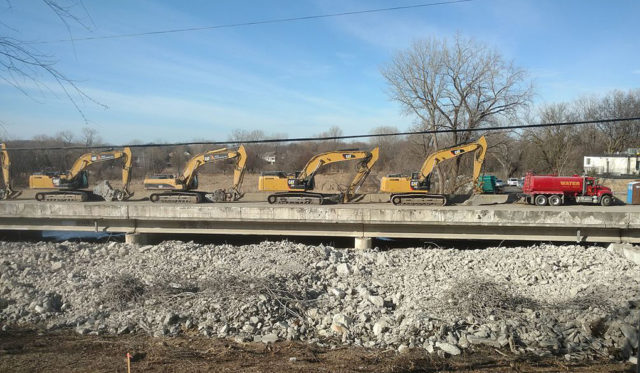
The American Society of Civil Engineers grades our national infrastructure a D-plus. We desperately need to modernize our roads, bridges, schoolhouses, railways, airports and water systems.
Donald Trump has made big, bold but vague promises of rebuilding America’s infrastructure. However, Trump’s proposed federal budget actually cuts infrastructure spending by $55 billion, according to an analysis by the University of Pennsylvania’s Wharton Budget Model, a nonpartisan research organization.
CNN reports that his proposed budget also seriously maims or eliminates several important federal infrastructure programs. An organization representing water utilities in rural areas condemned Trump’s proposal to eliminate a $500-million-per-year program that helps rural communities build and improve water, sewer, trash and street-drainage systems.
Trump also wants to eliminate the decades-old $3-billion-per-year Community Development Block Grant program, which has provided about $280 million per year to local infrastructure improvement projects in low-income neighborhoods.
Richard White, president of the American Public Transportation Association — which represents transit systems — said Trump’s proposed cuts would jeopardize 56 public-transit projects in early development stages. “It’s been a long time since we started a budget process where there was a major scale back or retreat from a federal role” in supporting transit infrastructure, White said.
The White House assures critics concerned about these infrastructure cuts that everything will be much better once the Trump administration rolls out its infrastructure bill. However, all indications are that Trump’s plan is really a hoax. As Congressman Jamie Raskin (D-Maryland) said, it is “just a private money-making operation for the big-business buddies of the president.”
Economist Robert Reich said Trump’s plan is essentially “a giant public subsidy to developers and investors, who would receive generous tax credits in return for taking on the job.”
Reich notes that in one version of the plan that he saw, “for every dollar developers put into a project, they’d actually pay only 18 cents — after tax credits — and taxpayers would contribute the other 82 cents through their tax dollars.
“No one should be surprised at this scheme. It’s what Trump knows best. After all, he was a developer who made billions, often off sweeteners like generous tax credits and other subsidies.
“The public would also pay a second time. The developers would own the roads and bridges and other pieces of infrastructure they finance. They’d then charge members of the public tolls and fees to use them.
“In place of public roads and bridges, we’d have private roads and bridges. Think of America turning into giant, horizontal-like Trump Tower wherever you looked.”
As the ranking member of the Senate Budget Committee, Bernie Sanders released a report on Trump’s infrastructure package. Sanders says that under Trump’s plan, “billionaires on Wall Street, wealthy campaign contributors and even foreign governments would receive hundreds of billions in tax breaks to purchase our highways, airports and water treatment plants.”
He goes on: “Trump’s plan to rebuild America relies heavily on the use of public-private partnerships to finance infrastructure projects with private equity capital. Such financing, whether through private equity or traditional tax-exempt municipal bonds, is repaid by ordinary citizens through a combination of taxes and user fees. Private equity financing is markedly more expensive than traditional government financing, however — by as much as three to six times. Considering the scale of infrastructure development under consideration, that difference could be enormous. For example: The charge for a $100 million investment using traditional government bond financing (at 3 percent, over 30 years) is about $90 million. For private equity capital, at a 15 percent return, the total skyrockets to $450 million.”
Sanders lists 10 failed public-private partnerships. For example, the City of Chicago in 2008 sold the right to manage the city’s parking meters for 75 years to a private investor group led by Morgan Stanley. From 2009-13, parking rates in Chicago increased by as much as 800 percent. The city has to pay Morgan Stanley $31 million to cover their lost revenue each time streets are closed in Chicago.
The Center on Budget and Policy Priorities (CBPP) provided an analysis of the infrastructure plan Trump’s campaign released last October. The group noted that there isn’t any mandate in the Trump plan to guarantee that the tax breaks would actually go toward new infrastructure, instead of subsidizing projects that were already going to happen or that would have been undertaken anyway.
The CBPP report said, “The plan has no mechanism to ensure that infrastructure projects flow to communities already underserved by infrastructure investment — to towns that have lost a major employer, rural communities lacking easy access to amenities, and low-income communities that lack basic necessities such as clean water. Instead, the investments likely would flow much more heavily to higher-income, more-developed communities where investors are more assured of ongoing income streams.”
In conclusion, the Trump plan is a cruel con job and a gigantic gift to the rich. Sad.
This opinion column does not necessarily reflect the views of Boulder Weekly.














